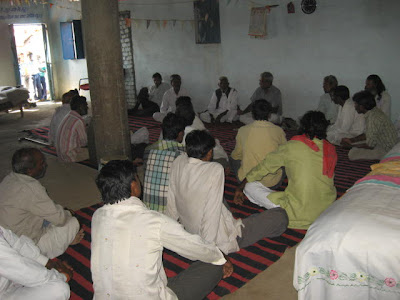लोकाविद्याधर समाज का मेल-मिलाप
मालवा-निमाड़ क्षेत्र के आदिवासियों ने लोकविद्या जन आन्दोलन के तहत एक ऐसी ज्ञान यात्रा निकाली जिसमें लोकाविद्याधर समाज का मेल-मिलाप उनके अपने ज्ञान के बल पर संभव हो पाया। अपने ज्ञान को समाज में बांटते हुए एकता का सन्देश देना अपने आप में एक अनूठा और सफल अनुभव रहा।
संतों की वाणी पर जनवरी से ही इंदौर के ग्रामीण क्षेत्रों में आयोजन किये जा रहे हैं। ग्राम खुर्दी में जनवरी में, फिर फरवरी में कारीगरों की बस्ती महावर नगर और ग्राम आगरा में ऐसे आयोजन किये गये। इन आयोजनों से प्रेरित होकर दिनांक 17 मार्च से 20 मार्च 2013 तक एक ज्ञान यात्रा का आयोजन किया गया। इस ज्ञान यात्रा में 25 गाँवों की मंडलियों ने भाग लिया।
17 मार्च 2013
ग्रामविद्यालोक कसरावद - राजेन्द्र यादव जी के सहयोग से ग्राम कसरावद में दोपहर 12 बजे से शाम 7 बजे तक मंडलियों ने संत कबीरदास, मीराबाई के दर्शन को गाकर समाज के सामने प्रस्तुत किया। बाज़ार हाट का दिन होने से लोगों की भागीदारी अच्छी रही। यहाँ पर ग्रामविद्यालोक वायतेल की लक्ष्मीबाई चौहान, शांति मारवाडा, अमरसिंह चौहान, नंदराम ठाकुर, अंतरसिंह चौहान, ने भी प्रस्तुति की .
ग्राम कसरावद में सबको पक्की नौकरी लोकविद्या के बल पर मिलना चाहिए इस बात पर सभी ने एकमत होकर अपनी सहमति दी।
18 मार्च 2013
ग्रामविद्यालोक मंडलेश्वर - सबेरे नर्मदा मैय्या के पवित्र जल में स्नान करने के बाद शालिबाना आश्रम में भोजन करके मंडलेश्वर में आयोजन की तयारी प्रारंभ की गयी। यहाँ अधिकारीयों ने अनुमति नहीं दी तो यह तय किया गया की इसे लेकर परेशान न होकर ग्राम महेश्वर में आयोजन कर लिया जाये। महेश्वर में भवानी माता के मंदिर पर अहिल्या बाई बस स्टैंड के पास दोपहर 1 बजे से शाम 5 बजे तक संत सबद और लोकविद्या सत्संग चला। महेश्वर के निवासियों ने भी भागीदारी की। बाबूलाल, राजीव चोके, किशोर मेरठ, जगदीश मेकेनिक और महेश रणसोरे ने महेश्वर में एक बार पुनः आयोजन करने की तैयारी दिखाई और यहाँ के ग्राम गवला, ग्राम इटावदी , ग्राम देवर की मंडलियों को सम्मिलित करने का सुझाव दिया।
18 मार्च 2013
ग्रामविद्यालोक ठीकरी - शरद महाजन के सहयोग से ठीकरी में रात्रि 8 बजे से 12 बजे तक संत सबद के मार्फ़त लोकविद्या सत्संग हुआ। नेमा धर्मशाला में पड़ाव व भोजन प्रबंध शरद महाजन ने किया। ठीकरी में दिनेश धनगर चाय का ठेला लगाते हैं। उन्होंने इस आयोजन को करने में पहल ली। कमल राठौर, मोतीलाल यादव, प्रशांत महाजन का भी सहयोग मिला। ठीकरी में कुछ लोगों ने दूसरे दिन यह प्रतिक्रिया जाहिर की कि इन आदिवासियों से ही समाज को नई दिशा मिल सकती है। कार्यक्रम बड़े स्तर पर पुनः आयोजित करने की मंशा प्रकट की गई।
19 मार्च 2013
ग्रामविद्यालोक कुक्षी - कुक्षी के सामाजिक कार्यकर्ता एवं लोकहित संघर्ष समिति कुक्षी के महिमाराम पाटीदार के सहयोग से सूर्या टाकिज के पास संत सबद के साथ लोकविद्या सत्संग दिन में 12 बजे से 5 बजे तक संपन्न हुआ। हाट बाज़ार का दिन होने से और मुख्य बाज़ार में कार्यक्रम होने से इसमें बड़ी संख्या में लोगों की भागीदारी रही। मंच के पास भारी संख्या में लोग इकट्ठा हो गये. लोकविद्या दर्शन को लोग बड़े ध्यान से सुन रहे थे. तभी किसी अधिकारी ने सरकारी परमिशन की बात उठाई। कुछ समय कार्यक्रम बंद रखा गया लेकिन उपस्थित लोगों के आग्रह पर इसे फिर से शुरू कर दिया।अय्यूब भाई ने खूब सहयोग दिया। महेश कामदार ने बईदा गाँव में रात्रि में कार्यक्रम करने का आग्रह किया। महिमाराम पाटीदार ने कुक्षी में एक और बड़े कार्यक्रम को करने की बात रखी। लोकविद्या के बल पर सबको पक्की नौकरी मिलना चाहिए इस मुद्दे पर सहमति बनी और अन्य मुद्दों पर भी बात हुई।
19 मार्च 2013
ग्रामविद्यालोक चिकली - चिकली में शाम 6 से रात्रि 9 बजे तक बैठक आयोजित की गयी। लोकविद्या समन्वय समूह चिकली के मगन सिंह बघेल के घर पर भोजन किया गया। बैठक में चिकली के कदम सिंह जामोद व अन्य ने अच्छा सहयोग किया।कई एक मंडलियों के सदस्यों को गेहूं की कटाई का समय होने से जल्दी गाँव लौटना था। बैठक में यह तय किया गया कि चूँकि ज्यादातर मंडलियाँ लौटना चाहती हैं इसलिए ज्ञान यात्रा को चिकली तक ही सीमित कर दिया जाये।
अगले कार्यक्रमों को आयोजित करने के उद्देश्य से ग्रामविद्यालोक गुजरी में 10 अप्रैल 2013 को एक बैठक आयोजित करने की घोषणा की गयी।
20 मार्च 2013
ग्रामविद्यालोक भकलाई - रात्रि के सफ़र के बाद कुछ मंडलियों ने ग्राम भकलाई में सत्संग किया। यहाँ भोजन किया और यहाँ ज्ञान यात्रा का समापन हुआ।लोकविद्या समन्वय समूह के संजीव दाजी और विद्या आश्रम सारनाथ से भारतीय किसान यूनियन वाराणसी मंडल के सचिव दिलीप दिली ने इस पूरी ज्ञान यात्रा के संयोजन में सक्रिय भूमिका निभाई।
लोकविद्या जन आन्दोलन अपने को कबीर, रैदास, मीरा, सूरदास तुकाराम, नानक, नरहरी, जनाबाई, घासीदास, तुकडोजी और गाडगे महाराज जैसे संतों की परम्परा में लोकविद्याधरों के ज्ञान आन्दोलन के रूप में देखता है। आज के झूठ और पाखंड से मुकाबले और सबके लिए न्याय के लिए यह आन्दोलन लोकविद्या के बल पर सबके लिए पक्की आय और सरकारी कर्मचारी के बराबर वेतन की मांग करता है. लोकविद्या दृष्टिकोण वह रास्ता बताता है जिससे यह संभव बनाया जा सकता है।
लोकविद्या समन्वय समूह
1924-डी , सुदामा नगर, इंदौर
मो. : 9926426858





